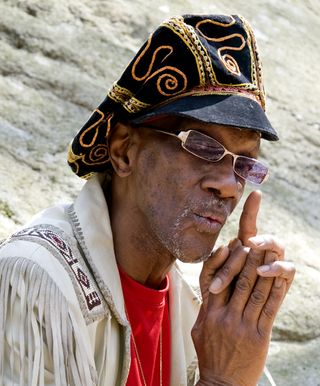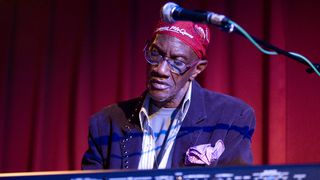Any day now, keyboard master Bernie Worrell and the nine musicians that make up the Bernie Worrell Orchestra will be traveling the US in a spiffy new, mega-sized van made possible by fan donations via Kickstarter. Concerning the all-important matter of who controls the music in the vehicle, the Parliament/Funkadelic pioneer says he'll leave it up to the others.
"Some of the guys have satellite radio, and they listen to this one R&B/ funk station," Worrell says. "That's the only way I hear the old stuff I used to do. It brings a smile to my face. I have to admit, I'm not big on new music."
And what does Worrell listen to when he wants to hear something good? "I listen to nature sounds," he explains. "It's less of a racket, and I get ideas listening to the birds and crickets and toads things. I get their sounds programmed into my head, and I make music with them. That makes sense to me more than new music. Nature sounds are real."
While maintaining a busy road schedule, the 69-year-old Rock And Roll Hall Of Famer is also readying the full-length debut album by the Orchestra, a winning set that features Worrell's easily identifiable clavinet and Minimoog wizardry backed by rollicking bass grooves, vibrant percussion and rousing horns.
Worrell recently sat down with MusicRadar to talk about his love of vintage synths, how prog-rock king Keith Emerson influenced his sound and what it was like working with P-Funk, the Talking Heads and the Pretenders.
OK, so you were able to get a new van from Kickstarter, but why did you stop there? You should have gone for the gusto - your own private jet!
[Laughs] "That's a funny one. What would I need a private jet for? That'd be too much for me, a jet. I don't need the worries. Big rock stars have jets and things like that. A nice van is good enough for me. But if somebody wants to donate more money, I could put it to use. I'll buy a house or go on vacation. [Laughs] That'd be a good idea - send me on a vacation."
You're described as having been a musical prodigy. I'm curious - how does someone know he's a prodigy? Do people just tell you?
"I didn't know. I still don't know! [Laughs] But that was the term people used for me since I was a young age, so I guess that's what they considered me. I was just into music. Since I was three and a half years old, l I could sight-read. My mother taught me scales. I practiced the piano every day and played perfectly.
"My mother deduced that there must be something there. The story is that she had a hard time finding a teacher for me because nobody had ever taught anybody so young. I passed by these eight year olds who were taking lessons. At four years old, I had my first classical concert."

"I enjoyed Emerson, Lake & Palmer," says Worrell. "Keith Emerson is a great player." © info@BostonMusicPhtography.com
I guess that qualifies you for being a prodigy.
"I guess. [Laughs] I was just enjoying myself. It came naturally to me."
When you joined Parliament/Funkadelic, you were already experimenting with the Mini Moog. There weren't too many people using that at the time.
"No, there weren't. I wasn't really interested in technology, but when I was in college, at the New England Conservatory in Boston, I used to listen to Emerson, Lake & Palmer. I loved the Tarkus album. Keith was the first guy I heard using the Moog. I liked the sound of that album and the things he was doing with the instrument.
"I found out that it was a Moog synthesizer, and later on I purchased my own Minimoog - or George did [laughs]. I started messing with the sounds. That's all I really do: I turn the knobs until it does what I want."
That's interesting about you listening to ELP. I didn't figure you for a prog rocker.
"I'm not, but I'm into everything - always was. I was born with perfect pitch, so anything I heard I could play right back for you. I don't know if I'm a 'prog rock' guy; I just know that if somebody does something good and is musical, I like it. I enjoyed Emerson, Lake & Palmer. Keith Emerson is a great player."
Did you ever try strapping yourself to your keyboard and twirling in the air on it? He did that back in the day.
"No, no, I never thought of that. [Laughs] I'll leave that to Keith. I'm too old for stunts."
Parliament/Funkadelic have influenced so many other artists. How does it feel to be called a pioneer?
"About the same as being called a 'prodigy,' I guess. It's cool, but I just do what I do. Back in the day, we got the opportunity to play live and record, and we went at it. Really, we were just funking around for fun, and it turned out that people liked it. We never thought it was going to be big."
Did George Clinton push you to be more adventurous with sounds?
"No, no. Can't nobody push me to do anything. [Laughs] I choose to do what I want at all times - what instruments I use and what I'm playing. It just happened that way. I said, 'Let's try this on this piece.' I put the approach on when I hear what we're doing. After I like something, I say, 'OK, hook that up for me, and let's go.'"
Was P-Funk an easy band to be a part of? There were so many members - I imagine there were some egos.
"Well, I sure smoked a lot of cigarettes back then. [Laughs] Guess I was dealing with the pressure and the strain and everything. When the band wasn't getting into arguments and fooling around, it was OK. There were family things that came up. A group that size, and everybody's living together, it's just like family. After they'd go through their antics and settle down with whatever was going on, I'd come in and crack the whip. 'All right, let's do Flash Light.'
"It was too many people in that band. George and I used to get into arguments - he had fights with the others, too. I thought it would have been good to cut the group down, but George liked the circus effect and the extravaganza."
But you have a big group now yourself. You like big bands, don't you?
"I like them both. It just so happens that this evolved into a big group. I like the idea of the horns. If it weren't for the horns, we'd be a six-piece group, and that's not big. The horns are great; they take me back to the P-Funk days or the sound of the Ohio Players. We can go into the jazz idiom or take it to avant-garde. The players are instrumentalists, arrangers and composers, so that means I don't have to do all the work."
The early synths you used in P-Funk - were they reliable? Did they break down a lot?
"The only one I had was the Minimoog, and it help up all right. Keith had the original synths with the patch cords and everything. That would be way too much to carry for me, those big walls of synthesizers - although they sure looked good; I'll give him that. [Laughs] I never had any problems with the Minimoog, other than keeping the oscillators in tune. A few hours before a performance, you had to power the thing up to make sure the oscillators were warm."

"I'd gladly go for the first synths over the new ones," says Worrell. "The new stuff isn't as fat and big sounding to me." © info@BostonMusicPhtography.com
What's your keyboard setup like now?
"I use a clavinet, a Minimoog - that's in the shop right now. Moog gave me a Little Phatty to use in its place."
How do you like it? They're pretty cool.
"Yeah, I like it. It's smaller than the Minomoog, so that's cool. But I prefer the sound of the Minimoog. The Little Phatty doesn't deliver like the old stuff; I'd gladly go for the first synths over the new ones. The new stuff isn't as fat and big sounding to me. I like big and fat. Vintage is better, man.
"I also have the Arp Pro-Soloist, which is another vintage synth that I used back in the day. I have a Kawai String Ensemble - well, it's not a String Ensemble, it's a synth. Boosty Collins bought it for me years ago, and I still use it."
Do you keep up with new gear? Are you a VST plug-in synth fan at all?
"No. No, I'm not. [Laughs] I'm an analogue guy. Digital's cold, you know what I mean? I know they have units and digital keyboards that can do it all, but I like the tones of the vintage keyboards. I have a bunch of things with me, and I don't have to lift them, so I don't worry about it." [Laughs]
What was it like working with the Talking Heads? Was that a fun situation?
"That was fun because they worked similarly in the studio to what P-Funk did, going in and jamming and having songs come out from that. Or there would be a part arranged and we'd build it up with overdubs. They were P-Funk fans. I found out that they used to sneak into P-Funk shows when they were art students in Providence.
"They were a good bunch. Dave is a genius and a conceptualist like George Clinton. He's very shy, but on stage he's extroverted. Chris and Tina were shy, too, but they're more outgoing than David. Chris was a sweetheart, and Tina was the mom of the group. She'd always tell people. 'You smoke too much,' even though she smoked, too. [Laughs] Jerry Harrison and I are real close. We're always seeing each other."
Several years after the Talking Heads, you worked with the Pretenders. How was that?
"It was OK. Chrissie Hynde could be tough at times, especially if you were wearing leather. No killing of animals for her, even for clothes. I liked the music. She sends me messages through TM Stevens. I knew some of her hit songs, but I think she was searching for something. She's not a funk singer, so it might not have come naturally. I think she was transitioning. She's cool, though."


